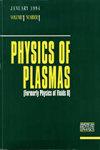Internal measurements of electromagnetic geodesic acoustic mode (GAM) in EAST plasmas
IF 2.2
3区 物理与天体物理
Q3 PHYSICS, FLUIDS & PLASMAS
引用次数: 0
Abstract
Velocity, density, and magnetic fluctuations of the geodesic acoustic mode (GAM) have been measured using the Doppler backscattering system, Faraday-effect polarimeter-interferometer, and external pick-up coils in the Experimental Advanced Superconducting Tokamak. Simultaneous measurements of density and velocity fluctuations at the midplane and top of plasmas demonstrate that m = 1 density fluctuations are quantitatively balanced by the compression of perpendicular flow fluctuations. Furthermore, internal magnetic fluctuations associated with GAM have now been directly measured by laser-based Faraday-effect polarimetry for the first time. Line-averaged magnetic fluctuations (up to 16 Gauss, B̃¯R,GAMBT∼0.066%) are significantly larger than those extrapolated from edge coils (a few Gauss) and that magnetic fluctuations increase with β. The observed discrepancy between finite β theory and experimental data indicates the need for further theoretical investigations.EAST 等离子体中电磁测地声波模式 (GAM) 的内部测量
利用多普勒反向散射系统、法拉第效应偏振干涉仪和先进超导托卡马克实验装置中的外部拾波线圈,测量了测地声波模式(GAM)的速度、密度和磁场波动。对等离子体中面和顶部的密度和速度波动进行的同步测量表明,m = 1 密度波动通过压缩垂直流波动得到了定量平衡。此外,基于激光的法拉第效应极坐标法首次直接测量了与 GAM 相关的内部磁波动。线平均磁波动(高达 16 高斯,B̃¯R,GAMBT∼0.066%)明显大于从边缘线圈推断的磁波动(几个高斯),而且磁波动随 β 的增加而增加。
本文章由计算机程序翻译,如有差异,请以英文原文为准。
求助全文
约1分钟内获得全文
求助全文
来源期刊

Physics of Plasmas
物理-物理:流体与等离子体
CiteScore
4.10
自引率
22.70%
发文量
653
审稿时长
2.5 months
期刊介绍:
Physics of Plasmas (PoP), published by AIP Publishing in cooperation with the APS Division of Plasma Physics, is committed to the publication of original research in all areas of experimental and theoretical plasma physics. PoP publishes comprehensive and in-depth review manuscripts covering important areas of study and Special Topics highlighting new and cutting-edge developments in plasma physics. Every year a special issue publishes the invited and review papers from the most recent meeting of the APS Division of Plasma Physics. PoP covers a broad range of important research in this dynamic field, including:
-Basic plasma phenomena, waves, instabilities
-Nonlinear phenomena, turbulence, transport
-Magnetically confined plasmas, heating, confinement
-Inertially confined plasmas, high-energy density plasma science, warm dense matter
-Ionospheric, solar-system, and astrophysical plasmas
-Lasers, particle beams, accelerators, radiation generation
-Radiation emission, absorption, and transport
-Low-temperature plasmas, plasma applications, plasma sources, sheaths
-Dusty plasmas
 求助内容:
求助内容: 应助结果提醒方式:
应助结果提醒方式:


